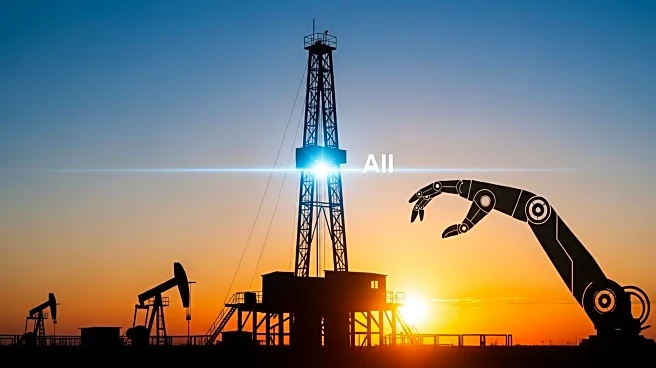What is the story about?
What's Happening?
The rise of artificial intelligence (AI) is reshaping workforce needs, particularly in the Texas energy sector. At the Energy Symposium hosted by the Kay Bailey Hutchison Energy Center at the University of Texas, industry leaders and academics discussed the expanding opportunities AI presents. Jim Breyer, founder of Breyer Capital, emphasized the potential for students entering the field, likening the current AI landscape to the beginning of a football game. Texas's competitive market, low regulations, and ample land make it attractive for AI investments. ExxonMobil's CEO Darren Woods highlighted the ongoing global demand for oil and natural gas, predicting they will constitute half of the energy supply by 2050, alongside a rise in solar and wind energy. The symposium underscored the need for diverse energy sources to meet global demands, with emerging technologies aiding in reducing carbon emissions.
Why It's Important?
The integration of AI into the energy sector signifies a shift in economic and career opportunities, particularly in Texas. As AI technology advances, it creates new roles and demands for skilled workers, potentially boosting the state's economy. The emphasis on diverse energy sources, including renewables, aligns with global efforts to reduce carbon emissions, impacting environmental policies and energy strategies. The development of projects like the molten salt research reactor in Abilene highlights innovation in energy technology, promising efficiency and safety improvements. These advancements could position Texas as a leader in energy innovation, attracting investments and fostering job creation.
What's Next?
The ongoing development of AI and energy technologies will likely lead to increased investments in Texas, further expanding job opportunities in the sector. Educational institutions like UT Austin are preparing students for careers in energy, offering programs that enhance their marketability. As AI continues to evolve, the energy industry may see shifts in operational practices and infrastructure needs, prompting companies to adapt and innovate. Stakeholders, including policymakers and business leaders, will need to address the balance between traditional and renewable energy sources to meet future demands.
Beyond the Headlines
The ethical implications of AI replacing human jobs remain a concern, necessitating discussions on workforce transition and retraining. The environmental impact of energy production continues to be a critical issue, with AI potentially offering solutions for more sustainable practices. The collaboration between academia and industry in Texas could serve as a model for other regions, fostering innovation and addressing global energy challenges.
















